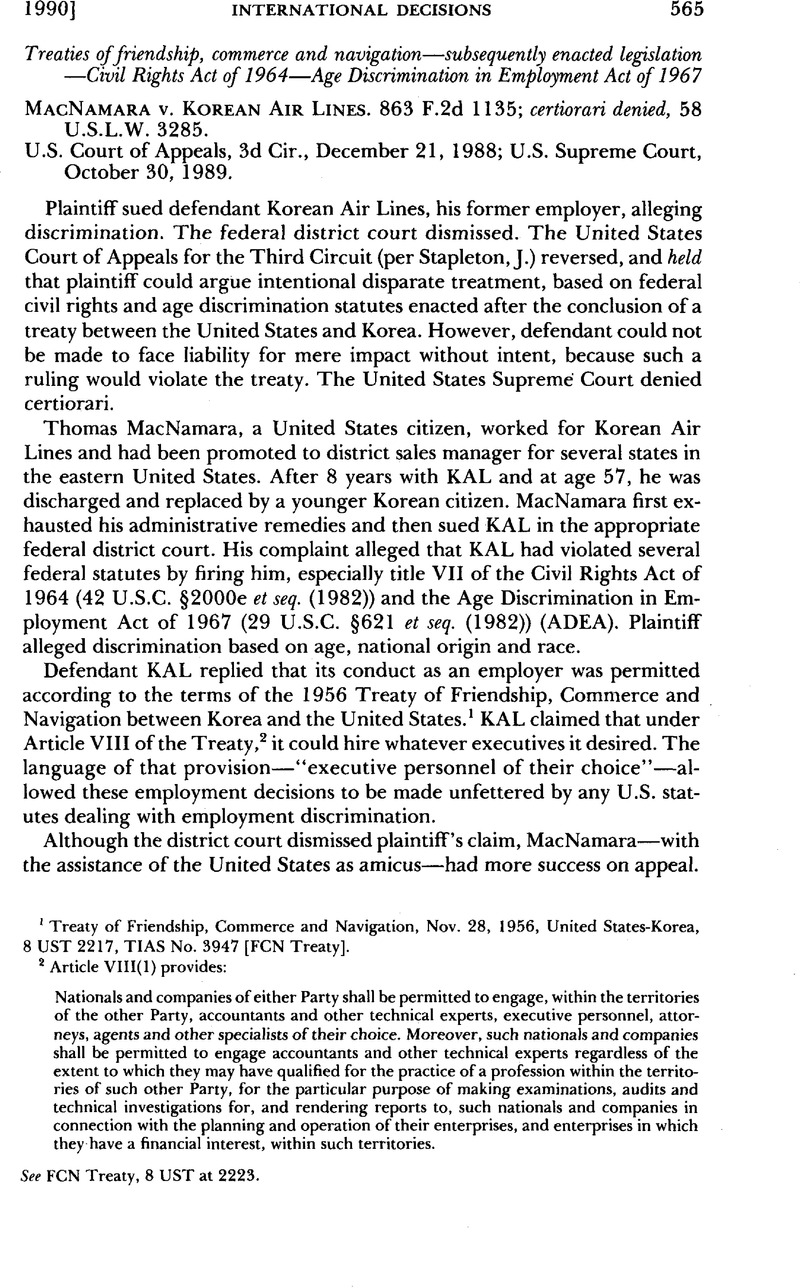Article contents
Treaties of friendship, commerce and navigation—subsequently enacted legislation —Civil Rights Act of 1964—Age Discrimination in Employment Act of 1967
Published online by Cambridge University Press: 27 February 2017
Abstract

- Type
- International Decisions
- Information
- Copyright
- Copyright © American Society of International Law 1990
References
1 Treaty of Friendship, Commerce and Navigation, Nov. 28, 1956, United States–Korea, 8 UST 2217, TIAS No. 3947 [FCN Treaty].
2 Article VIII(l) provides:
Nationals and companies of either Party shall be permitted to engage, within the territories of the other Party, accountants and other technical experts, executive personnel, attorneys, agents and other specialists of their choice. Moreover, such nationals and companies shall be permitted to engage accountants and other technical experts regardless of the extent to which they may have qualified for the practice of a profession within the territories of such other Party, for the particular purpose of making examinations, audits and technical investigations for, and rendering reports to, such nationals and companies in connection with the planning and operation of their enterprises, and enterprises in which they have a financial interest, within such territories.
See FCN Treaty, 8 UST at 2223.
3 Spiess v. C. Itoh & Co. (America), 643 F.2d 353 (5th Cir. 1981), vacated, 457 U.S. 1128 (1982).
4 Avigliano v. Sumitomo Shoji America, Inc., 638 F.2d 552 (2d Cir. 1981), vacated, 457 U.S. 176(1982).
5 Wickes v. Olympic Airways, 745 F.2d 363 (6th Cir. 1984).
6 In brief, MacNamara argued that he was terminated and the Treaty refers only to engaging employees. He also maintained that he was not an “executive” under the Treaty provision. The court reasoned that the proposed interpretation would impermissibly “tend to freeze a foreign business’ initial management structure and discourage any experimentation with host country executive personnel.” 863 F.2d at 1141. On the status point, the court relied heavily on the type of visa held by the Korean replacement, which is available only to personnel performing supervisory or executive functions.
7 The court referred to, and quoted from, an important article by Herman Walker, Treaties for the Encouragement and Protection of Foreign Investment: Present United States Practice, 5 Am. J. Comp. L. 229 (1956).
8 863 F.2d at 1144 (emphasis by court).
9 Id. at 1139.
10 Id. (quoting Sumitomo, 638 F.2d at 559).
11 Id. at 1140 (quoting Sumitomo, 457 U.S. at 187–88).
12 Id. at 1145.
13 W. at 1147.
- 2
- Cited by


